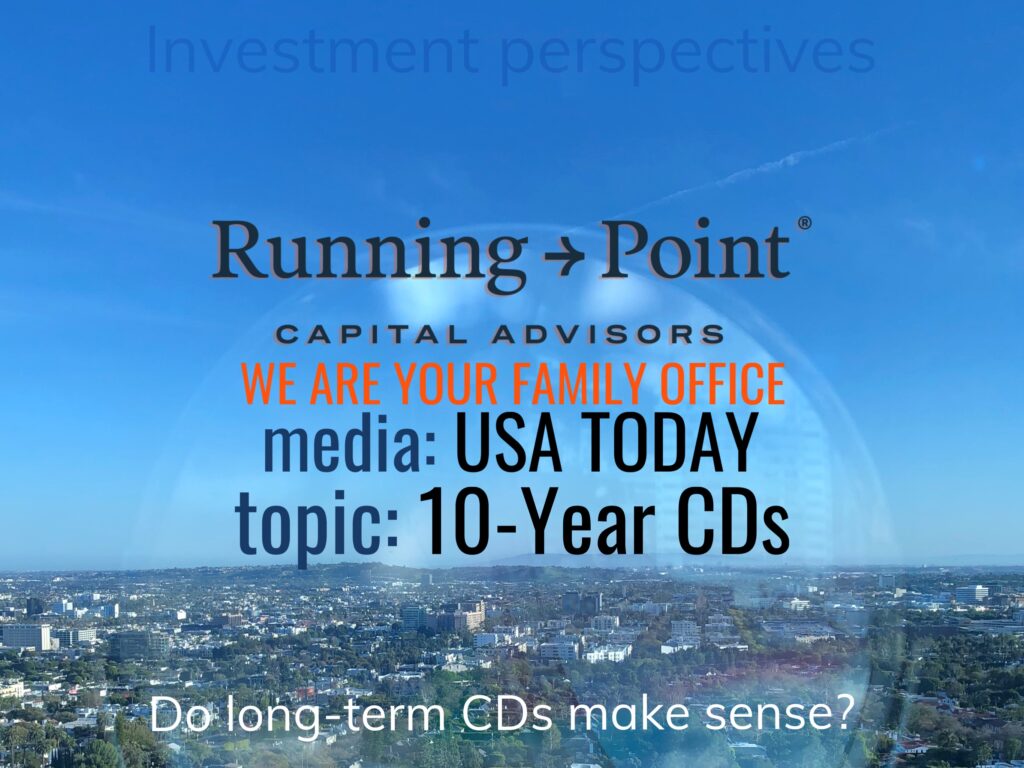Do long-term CDs make sense?
Running Point and its chief investment officer, Michael Ashley Schulman, CFA, were quoted by USA Today in an article — by John Egan and Jenn Jones, “Best 10-year CD rates of June 2023” — regarding 10-year certificate of deposits (CDs) and whether they make sense in this economic environment.
What is a CD?
A certificate of deposit (CD) is a financial instrument that allows you to earn interest on a lump sum of money over a specific duration. Unlike regular savings accounts, CDs require you to keep your funds untouched for the entire agreed-upon term, or else you may incur penalties or lose out on interest. In order to compensate for the limited access to your funds, CDs typically offer higher interest rates compared to regular savings accounts. This serves as an incentive for individuals to accept reduced liquidity in exchange for potentially greater returns.
Long-term CDs 💵
10-years? People don’t often seek out a 10-year CD, but if you were to choose one, look for reputable banks, credit unions, and other financial institutions that offer CD products by researching online or visiting local branches to gather information about their CD rates, terms, and penalties for early withdrawal. Commonly, you’d look for the ones that offer the highest annual percentage yield (APY) for a 10-year term, but along with their rates you also want to do a side-by-side comparison of their account terms, minimum deposit requirement, fees, and penalties for early withdrawal.
Promotional rates: Some financial institutions may offer promotional rates for new customers or for a limited time; therefore check if the CD rate you are considering is a promotional rate that may change after a certain period.
Deposit insurance: Additionally, if you invest more than $250,000 in a single CD, i.e., more than the FDIC-insured (for banks) or NCUA-insured (for credit unions) limit, you should take extra care regarding the reputation and financial stability of the bank, credit union, or other financial institution you are dealing with to ensure the safety of your investment.
CDARS: The Certificate of Deposit Account Registry Service (CDARS) can be used to work around FDIC insurance limits. A CDARS placement and custodial agreement invests money through a network of members distributing your CD holdings to various banks in order to stay below FDIC limits at each member bank. You could use this to place millions of dollars and still be FDIC protected, however you are still limited by the rules and illiquidity provisions that come with certificates of deposit (CDs).
Taxes: Also note that regardless of how long you lock up your money for in a CD, you have to pay tax on any CD interest the year it was earned. Therefore, on a 10-year CD, you’ll pay taxes annually on income that you can’t access!
Term: Deciding between a 2-year CD and a 10-year CD, or any other term, is as much a budgeting question as it is an income question.
Access: If you seek easy access to your money and want to be able to write checks or make withdrawals, a money market account might be a better choice. If you have a lump sum of money that you won’t need for a specific period and you’re comfortable with locking in your funds for a set term, a CD might offer a better return. However, if you are unsure on when you will need the proceeds, be aware that CDs are subject to withdrawal penalties. Some banks may penalize you 90 days’ simple interest for CD terms under 1 year and 180 days’ simple interest for terms longer than 1 year. In fact, Federal law requires a minimum penalty on early withdrawals from CDs, but sets no maximum penalty. Carefully review any specific account agreements and policies or ask a financial fiduciary for guidance.
Advice: If you are unsure about which CD term to choose or investment to make, consider seeking advice from a fiduciary who can provide you with personalized recommendations based on your financial goals and risk tolerance.
Quoted article excerpt:
…when picking the best 10-year CD, consider more than the interest rate.
“Weigh factors such as minimum deposit requirements, fees and early withdrawal penalties,” said Michael Ashley Schulman, chief investor officer at Running Point. “Fees and penalties can easily water down the interest you earn.”

Do not save what is left after spending, but spend what is left after saving.
Warren Buffett
Disclosure: The opinions expressed are those of Running Point Capital Advisors, LLC (Running Point) and are subject to change without notice. The opinions referenced are as of the date of publication, may be modified due to changes in the market or economic conditions, and may not necessarily come to pass. Past performance is not indicative of future results. Forward-looking statements cannot be guaranteed. Running Point is an investment adviser registered with the U.S. Securities and Exchange Commission. Registration does not imply a certain level of skill or training. More information about Running Point’s investment advisory services and fees can be found in its Form ADV Part 2, which is available upon request. RP-23-56


